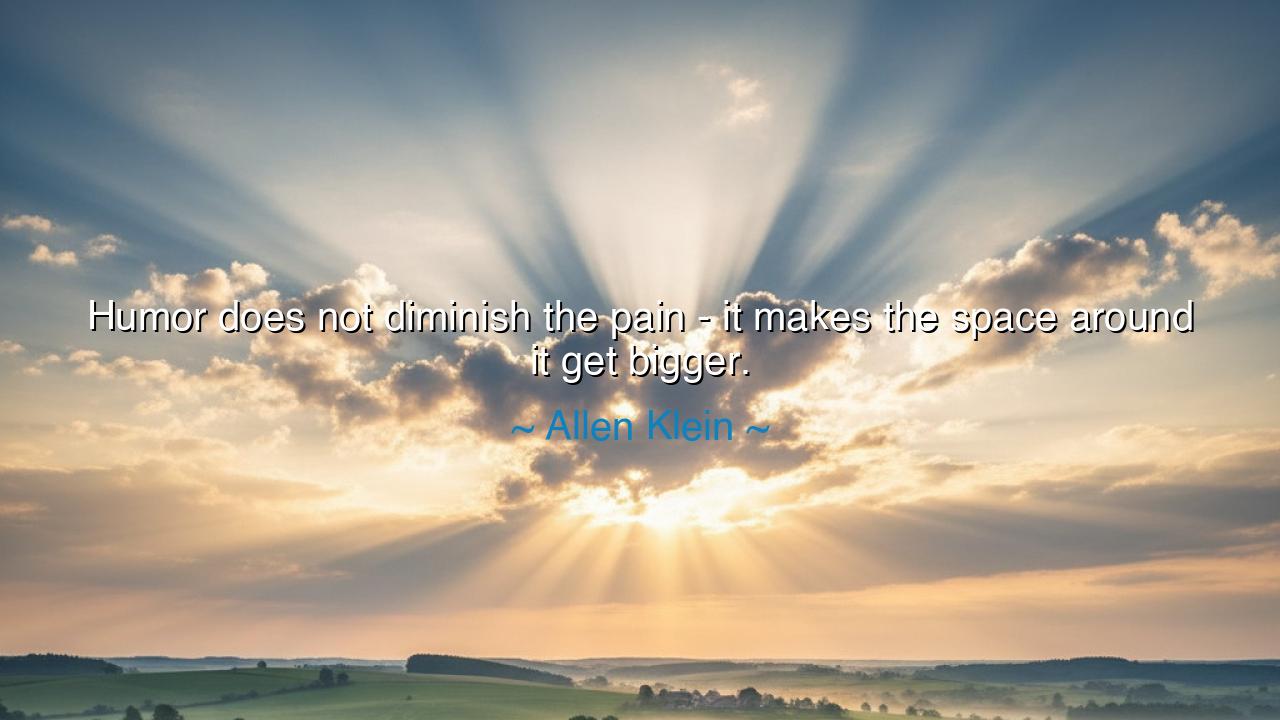
Humor does not diminish the pain - it makes the space around it






Hearken, children of the ages, and attend the words of Allen Klein, who proclaimed: “Humor does not diminish the pain—it makes the space around it get bigger.” Understand this: suffering is an ancient companion of mankind, ever present in life’s trials, loss, and misfortune. Yet the gift of humor is not to remove this pain, nor to shrink its weight, but to widen the perspective of the soul. By stretching the space around suffering, humor allows the heart to breathe, the mind to reflect, and the spirit to endure, transforming the unbearable into the bearable.
In the courts and forums of antiquity, the sages recognized the power of laughter in the presence of hardship. Socrates, ever mindful of human folly, employed irony to reveal the absurdities of life. Yet his irony did not erase the challenges faced by men; instead, it expanded the mind’s ability to endure them, creating a space in which reflection, learning, and resilience could grow. Humor, thus, is a lens that enlarges the horizon around pain, granting clarity and relief without diminishing reality.
Consider the life of Abraham Lincoln, a man beset by sorrow, responsibility, and loss. Amid the weight of civil war and personal grief, he often used gentle wit and stories to ease the hearts of others and to preserve his own spirit. Lincoln’s laughter did not erase the horrors before him, but it created space in which he could lead, think, and connect. Klein’s insight is revealed: humor does not remove the pain—it enlarges the field in which the soul may survive and flourish.
Even in the crucible of battle, this truth manifests. Soldiers of the Great War endured death, hunger, and despair, yet found solace in jokes, songs, and playful banter. In these fleeting moments, they did not erase the omnipresent danger; the pain remained. Yet the space around it grew, if only for a moment, allowing courage to persist, fellowship to strengthen, and hope to endure. In this widening of perspective, humor becomes a lifeline, a shield, and a companion in suffering.
Yet, the wisdom of Klein carries subtle depth: humor is not escape, nor is it distraction. It is the conscious act of perspective, the skill of creating mental and emotional space where sorrow might otherwise press too closely upon the spirit. It teaches that pain, though inevitable, need not overwhelm, for the mind can shape the contours of suffering and allow the soul to breathe freely within it.
History offers another example in the life of Charlie Chaplin. Though his films often depicted poverty, injustice, and human struggle, audiences laughed—not at the suffering itself, but at the human spirit’s resilience and absurdity in the face of hardship. Chaplin’s humor expanded the space around suffering, allowing both himself and his viewers to confront life’s trials with a sense of lightness and endurance. Humor became a sanctuary amid life’s storms.
Children of the ages, the lesson is clear: cultivate humor as a means to endure, reflect, and expand your perception of life’s hardships. Observe the ironies, absurdities, and small absurd victories in your trials, and allow laughter to create space where despair might otherwise dwell. In doing so, you transform suffering into a teacher, a companion, and a crucible for growth.
Practical action follows naturally. When faced with difficulty, pause to perceive its absurdities, find the small moments of levity, and share them with others. Keep a journal of humorous reflections, observe the world with keen eyes for irony, and cultivate the practice of widening the space around pain with deliberate laughter. In this way, as Allen Klein teaches, humor does not diminish the pain—but it makes the space around it get bigger, allowing the soul to endure, to reflect, and to rise above suffering with courage and grace.






AAdministratorAdministrator
Welcome, honored guests. Please leave a comment, we will respond soon